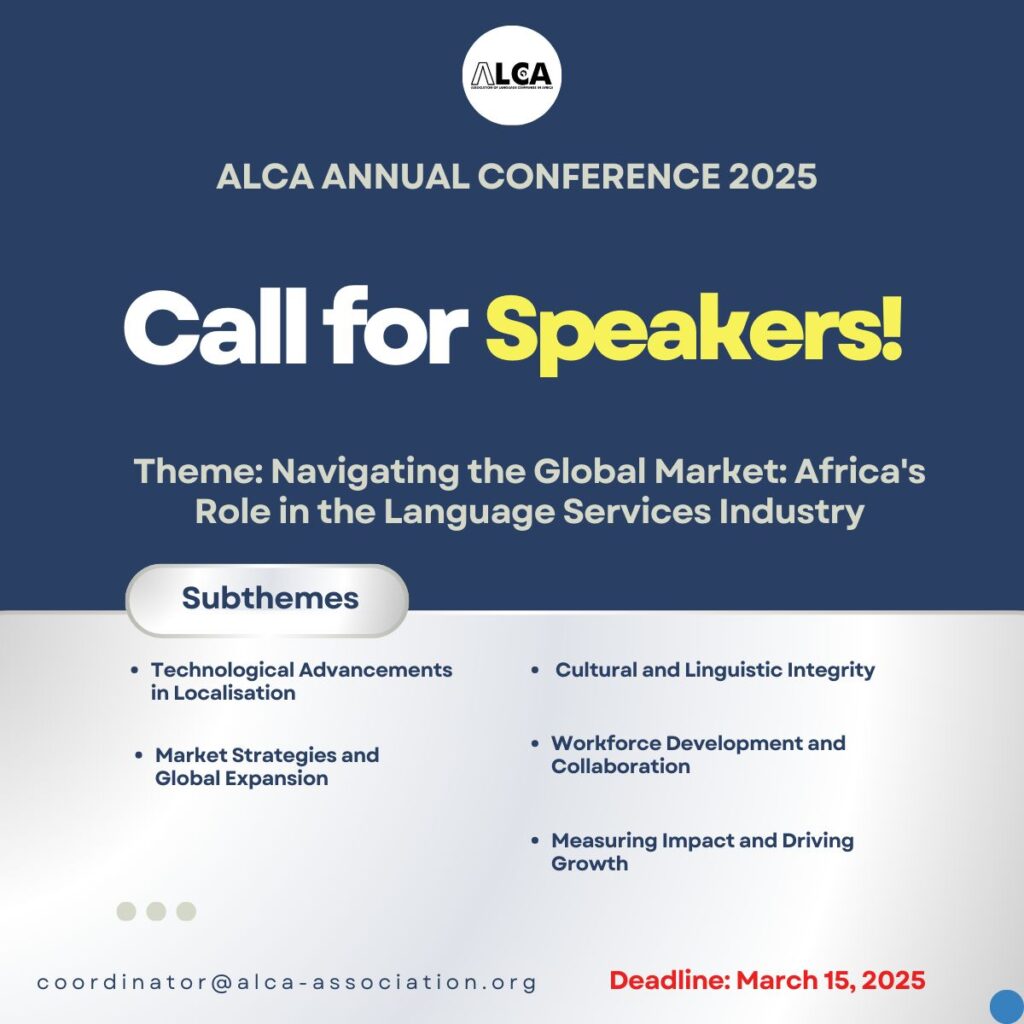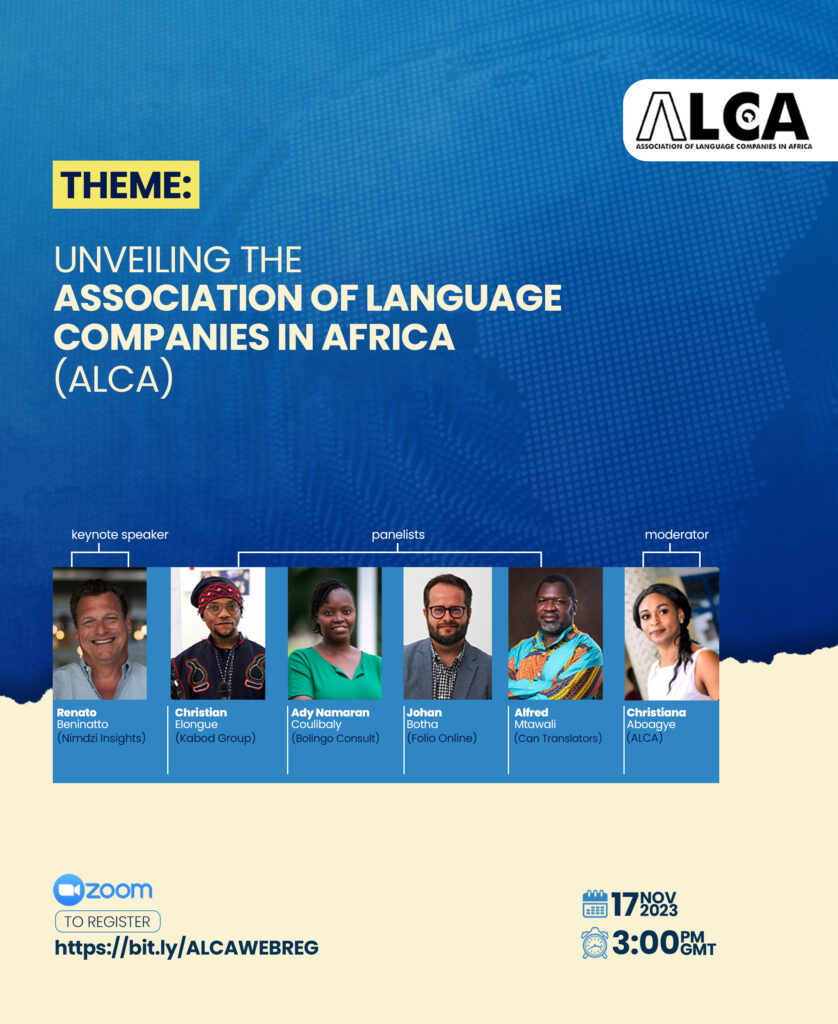Call for Speakers

Deadline: March 15, 2025Time: 23:00 PM Universal Time (UTC) ALCA invites industry professionals, researchers, and business leaders to submit proposals to speak at the conference. Presentations, case studies, and panel discussions are welcome on topics such as: Interested speakers should submit their proposals by March 15, 2025. Registration:Please submit your proposals by using this link in Register Here Please kindly submit ONLY one proposal.
Upcoming Webinar: Navigating Pricing Strategies for LSPs

Date: October 18, 2024Time: 1:00 PM Universal Time (UTC)Featured Speaker: Oumi Ferguson The Association of Language Companies in Africa (ALCA) is excited to announce an insightful webinar tailored for Language Service Providers (LSPs) looking to enhance their pricing strategies in today’s competitive market. Webinar Title: Navigating Pricing Strategies for LSPs: Balancing Profitability and Value in a Competitive Market In this engaging session, industry expert Oumi Ferguson will share her expertise on pricing models and strategies that drive profitability while ensuring exceptional value for clients. Participants will gain valuable insights into: This webinar is ideal for LSP owners, managers, sales professionals, and anyone involved in pricing strategy or business development within the localization industry. Q&A Session: An interactive Q&A session will follow the presentation, providing participants the opportunity to address specific challenges and gain insights directly from Oumi. Don’t miss this opportunity to refine your pricing strategy and drive profitability in your organization! Registration:Please register in advance to secure your spot: Register HereAfter registering, you will receive a confirmation email with information on joining the meeting. Join us and take a significant step toward optimizing your pricing strategies for long-term success!
Dealing With New And Old Problems In The Language Services Industry – Challenges And Solutions

Author: Rita Prazeres Gonçalves Introduction The world of translation is changing, and the way freelance translators and translation companies (LSPs) work together is changing too. However, there has never been a time when these two major actors in this business needed each other so much. In this article, I will look at some of the latest changes the industry faces, but also at some old problems that have not necessarily been addressed and are still pain points for many translators and LSPs. Prices and Deadlines In more recent years, the pressure to deliver faster and more affordable translation has turned this space from a place where professional freelance translators, with a fair amount of experience and expertise could feel like they were established and knew (for the most part) what they could take on: a steady workflow, a secured place in the list of preferred translators in quite a few LSPs, maybe a direct client here and there, the need to keep on learning and evolving at a nice pace, working on their skills to include a new specialization… These days, with all the investment made in new technologies, mergers and acquisitions and the constant need to show an improvement in gross and net profit, LSPs must find ways to cater to the demands of all parts involved and, many times, offer their translators, and other language professionals, lower rates, and increasingly shorter deadlines. As a result, freelancers face the dilemma of accepting reduced rates, undermining the value of their expertise, and keeping up with insane turnaround times that leave them feeling frustrated and anxious about their future. Isolation and Lack of Support Most freelancers feel anonymous and undervalued within the industry. From LSPs that contact their talent via automated messages and are always looking for the cheapest vendor to assign projects, to agencies that ghost them after a long recruitment process – including filling out paperwork, preparing credentials and references and an unpaid translation test, translators can feel drained. In most cases, freelancers work from home, which has its advantages in terms of flexibility and opportunities but has less positive consequences, such as isolation, lack of support, and poor mental health. All this leads to disengagement and disillusionment. The African Landscape I have recently connected with a few of the members of ALCA. This led me to look for a bit more information about the language services scene in this magical continent. I found the conversation that Johan Botha (co-founder of ALCA), had with GALA about the language technology in Africa. See more here. All the current issues that affect the language services industry seem a bit less difficult to deal with, when we realize that in this part of the world some of the greatest issues are related to “connectivity”. This needs to be taken into consideration in the process of localizing content for the region. It was just incredible for me to hear all the hurdles that translators, LSPs and clients go through to get projects done. Johan mentioned things like difficult access to on-line CAT Tools, the excessive cost of internet services, the fact that translators need to avoid high traffic in internet connections, the lack of resources like glossaries, term bases, TMs, and many other factors. All of this has a tremendous impact on the way projects and workflows need to be managed. I am, now, wondering… what kind of relationship do freelance translators in African countries have with both local and global LSPs? What kind of help do they have to provide to each other to somehow be able to cater to the language needs of their clients and audiences they serve. If language professionals are facing complicated times, and feel the need to change so many things around. When technical issues of this magnitude are not in their list of pain points. How do African freelancers deal with this and everything that is going on in the industry? The Future is Now! This is the time to acknowledge the realities of the big language services family. Both freelance translators and LSPs can work together to find solutions that benefit everyone involved. Let us build a future where freelance language professionals are valued partners. In this scenario transparent communication, and fair treatment are essential. Through close collaboration, and a genuine commitment to understanding each other’s specific situations, we can do better, be better and make the industry better. I find myself thinking that we need to learn more from the human library we have access to through social media platforms, networking events, conferences, and other forums and be supportive of others who are facing the same challenges as us, but under even harsher conditions. The way forward is all about Communication, Trust, and Community! I cannot wait to hear from translators and company owners what their experience is regarding all this and what they have been doing to ensure clear communication, positive human relations, and, above all, trust in each other!
ALCA Industry Research Commissioning Initiative

Terms of Reference (ToR) Background Africa’s over 2000 languages paint a vibrant picture of diverse cultures and perspectives. Yet, bridging these linguistic divides can be a significant obstacle, hindering communication and knowledge exchange. This is where Language Service Providers (LSPs) emerge as vital actors, weaving bridges between languages and fostering understanding. Researching the landscape of LSPs in Africa transcends mere market analysis. It delves into a realm where marginalized languages find their champions, local businesses gain a global voice, and knowledge flows freely across borders. Imagine a research endeavor that maps the expertise of LSPs, ensuring even the least common languages have their specialists. Such knowledge empowers communities and safeguards linguistic heritage. Imagine policymakers, armed with research insights on LSPs, crafting policies that dismantle language barriers in education and public services, fostering a more inclusive society where everyone participates and thrives. The significance of researching LSPs extends far beyond the industry itself. It unlocks Africa’s potential by empowering skilled professionals, expanding business horizons, and enriching lives through knowledge exchange across the continent. It envisions a future where communication flows seamlessly, fueled by LSP expertise and the power of mutual understanding. When a voice is translated, a document localized, or a message interpreted across African languages, recognize the critical role of LSPs. Remember, research in this domain is not merely about numbers, but about weaving a brighter future where every voice is heard and understood, thread by precious thread. This is why the Association of Language Companies in Africa (ALCA) is seeking applications from researchers to conduct a comprehensive industry research initiative. The aim of this research is to provide insights about language services companies in Africa and the environment in which they operate. Methodology The research will utilize a combination of qualitative and quantitative methods, including surveys, interviews, and data analysis while prioritizing ethical considerations and ensuring informed consent, confidentiality, and data security. Timeline The research initiative is expected to span three (3) months, with specific milestones outlined for each research section. Qualification of the Researcher The selected researcher should hold a minimum of a Master’s or Ph.D. degree in humanities or related field. Evidence of previous research related to the area of this research will be an advantage. Proposal Submission Researchers are invited to submit their proposals by March 5, 2024 to coordinator@alca-association.org. Proposals should include details on the researcher’s qualifications, experience.
Association of Language Companies in Africa Launches to Unify Continent’s Industry

February, 09,2024 Much news in the language industry is focused on the “global North,” namely Europe, North America, and parts of Asia. Africa is often mentioned in relation to improved coverage of, or technology for, low-resource languages. However, the launch of a new initiative in Africa will help mitigate this lack of awareness. As of 2020, the Masakhane Project had gathered more than 60 participants from 15 countries to collaborate and build machine translation (MT) models for African languages. And now, a new professional organization for language service providers (LSPs) in Africa is making its debut at the 4th Africa International Translation Conference in Kigali, Rwanda. The Association of Language Companies in Africa (ALCA) was officially registered as a non-profit in August 2023 in Accra, borne out of what its four co-founders saw as an opportunity for an umbrella organization to connect existing regional associations. Africa’s traditional localization hubs are in South Africa, Egypt, and Kenya, with “countries such as Ghana, Rwanda, and Cameroon quickly becoming strong contenders in their own right,” explained ALCA co-founder Johan Botha. Kabod Group’s Christian Elongué and Bolingo Consult’s Ady Coulibaly, both in Ghana, began to discuss a unifying association for African LSPs in early 2023. They were soon joined by Alred Mitwali from CAN Translators in Kenya, and Botha, of Folio Online in South Africa. Botha told Slator that the number of LSPs in Africa is currently impossible to estimate without reliable data, due in part to companies not participating in — or even being aware of — international industry surveys. If there were more data, Botha said, “I do expect that companies with one to three employees would dominate the landscape in more regions of the continent.” The advent of technology, and AI in particular, convinced ALCA’s co-founders that now was the time to appeal to African LSPs. Working in regional isolation, Botha said, has historically slowed down the African language industry’s growth as a whole. While they grapple with many of the same issues as LSPs in other parts of the world, companies in Africa may have to take into account additional considerations. “Connectivity issues are unfortunately still widespread across the continent and [are] a big headache for many LSPs wanting to provide a cutting-edge online service using all of the latest tools and cloud software,” he said. Botha noted that the ALCA launch in Kigali will offer a chance for the organization to speak to ALCA’s main target market in person, adding, “This is still very early days but so far the response has been extremely positive.” Source: Slator
Coopetition Success Stories

Unity in Diversity: Unveiling Coopetition Triumphs with Emmanuel Clifford Gyetuah in the African Language Industry In a recent insightful interview with Emmanuel Clifford Gyetuah, the Growth Manager responsible for Finance, Partnerships and Revenue Generation at Bolingo Consult, the dynamic landscape of the language service industry came into focus. The conversation delved into key aspects of the industry, shedding light on challenges, opportunities, and the significance of collaboration. Gyetuah, a goal-oriented leader, emphasized the pivotal role of mindset in the language service industry. Beyond the technicalities of translation, he underscored the need for a holistic approach to business. Project management, marketing, HR, vendor management, quality checks, and sales were identified as integral components for success. The interview unveiled the triumphs of Bolingo Consult in coopetitive collaborations with fellow Language Service Providers (LSPs), resulting in a notable surge in revenue. Speaking on coopetition, Gyetuah expressed, “Coopetition allows us to work together while fighting for the same spot, meaning sharing resources and…” This unique approach has been pivotal in propelling Bolingo Consult to the forefront of the language service industry in Africa. A recurring theme in the conversation was the necessity of long-term investments. Gyetuah emphasized the importance of certifications, citing ISO as an example. This strategic investment positions language service providers for higher-tier projects and enhances credibility amid fierce market competition. The interview touched on the transparency of rates within the industry. Gyetuah expressed the value of understanding competitors’ rates, suggesting that this knowledge could empower language service providers to make informed decisions and negotiate effectively. Recognizing that challenges are inevitable, Gyetuah highlighted the key to learning from them. The importance of integrity was emphasized, with anecdotes shared about admitting mistakes and offering refunds as a demonstration of commitment to honesty in business relationships. For those venturing into the language service industry, collaboration was positioned as the cornerstone of success. Gyetuah encouraged newcomers to embrace partnerships, leverage shared experiences, and collectively contribute to the industry’s growth. The conversation took a broader turn towards the benefits of promoting competition within professional associations, notably alluding to ALCA. Gyetuah portrayed competition as a catalyst for industry growth, dispelling the notion that growth in one entity necessarily means contraction in another. The interview concluded with reflections on the pivotal role of effective language policies in propelling the industry forward in Africa. Drawing parallels with successful Western strategies, Gyetuah urged African nations to adopt policies supporting language services, envisioning the industry as a significant global player. As Bolingo Consult charts its course in the dynamic language service sector, the revelations from Emmanuel Clifford Gyetuah serves as not just a testament to their success but also as a guiding light for others navigating the ever-evolving landscape of language services.
ALCA Call for Content – 2024

ALCA invites language professionals to contribute their expertise and insights to our community. We’re excited to announce our Call For Content for Q1, featuring two dynamic themes Q1 2024 Themes ‘AfriCoopetition’ – Fostering Collaboration in African Language Services For our Q1 Call For Content, we are diving into the theme of ‘AfriCoopetition’. Here are some prompts to spark your ideas: International Women’s Day Special: Invest in Women, Accelerate Progress Submission Guidelines We welcome original, informative, and engaging content that addresses pertinent topics in the language services industry in Africa. Whether it’s best practices, emerging trends, technological advancements, case studies, or industry insights, your contributions play a crucial role in advancing our shared knowledge. How to Contribute You have the flexibility to contribute in various formats, such as writing a blog post, an article, presenting a webinar, moderating a panel discussion, or participating in an interview. The possibilities are diverse! Connect with us at coordinator@alca-association.org to discuss your ideas. Open to All Our Call For Content is open to both ALCA members and non-members, although members will receive priority for publication. Calling Academic Researchers, Trainers, and Professors Academic contributors, share your research on the impact of coopetition in linguistics, computational linguistics, translation, and interpreting studies. We also encourage articles and blog posts on how academia and the industry can work together.
Celebrating Linguistic Diversity through Co-opetition

by Helga Walker (Women In Localization – Global Growth & Diversity) In the vibrant tapestry of the African continent, language stands as a testament to its rich cultural diversity. With over 2,000 languages, Africa’s linguistic landscape is not just a feature of its cultural identity, but also a significant player in its economic and technological advancement. In this era of globalization, the concept of co-opetition – blending cooperation with competition – has emerged as a pivotal strategy in leveraging this diversity for collective growth and individual excellence. The Co-opetition Model Co-opetition, a strategic approach that combines the strengths of cooperation with the vigor of competition, offers a unique framework for understanding and promoting linguistic diversity in Africa. It encourages entities to collaborate in areas where shared goals can be achieved, such as language preservation and digitalization, while still competing in markets and innovation. This model fosters an environment where different stakeholders – governments, private companies, and educational institutions – can work together towards common objectives, yet maintain their distinct competitive advantages. Celebrating Diversity through Collaboration One of the most remarkable aspects of co-opetition in the African context is its role in celebrating and preserving linguistic diversity. Collaborative projects like multilingual educational programs, digital language archives, and cross-border linguistic research initiatives have been instrumental in this regard. These cooperative endeavors help in documenting and promoting lesser-known languages, thus preserving the continent’s rich heritage and knowledge systems. Competition Drives Innovation While cooperation aids in the preservation and sharing of linguistic resources, competition is the catalyst for innovation and excellence. Competition among tech companies in Africa, for instance, has led to the development of cutting-edge translation software and language learning apps that cater to a variety of African languages. This competitive spirit drives quality and accessibility, making language learning tools more user-friendly and efficient, thus further promoting linguistic diversity. The Global Stage In the global marketplace, African languages are increasingly gaining prominence. Here, co-opetition plays a crucial role in positioning these languages favorably. Companies and cultural institutions often collaborate to showcase African languages on international platforms, while simultaneously competing to establish their brands or cultural narratives. This not only elevates the status of African languages globally but also opens up new economic avenues tied to language and culture. The celebration of Africa’s linguistic diversity through the lens of co-opetition is a testament to the power of collaborative synergy and competitive spirit. It highlights the potential of languages as tools for unity, cultural expression, and economic advancement. As Africa continues to navigate the complexities of a globalized world, the co-opetition model stands as a beacon, guiding the way towards a future where linguistic diversity is not just preserved but is also a cornerstone of innovation and growth. As we embrace the multitude of voices and dialects that make up the African continent, we are reminded of the strength found in our diversity. It is through this intricate dance of collaboration and competition that Africa’s linguistic heritage will continue to thrive and make its mark on the world stage.
Association of Language Companies in Africa (ALCA) Announces Pre-Launch Event

November 15, 2023 The Association of Language Companies in Africa (ALCA) is thrilled to announce its upcoming unveiling event to be held online on Friday, November 17 from 3pm to 4:30pm GMT. This event marks a significant milestone in the journey toward fostering collaboration, setting industry standards, and creating opportunities for language service providers (LSPs) across the continent. The event promises engaging sessions, including a keynote address by renowned industry expert Renato Beninatto from Nimdzi Insights on the role of associations in advancing the language industry. Founding board members Ady Namaran Coulibaly of Bolingo Consult, Christian Elongue of Kabod Group, Johan Botha of Folio Online, and Alfred Mtawali of Can Translators will share insights into ALCA’s mission, values, and vision while addressing its expected impact on the language industry. These industry leaders will also discuss the current state and future of language services in Africa. The virtual event is open to language companies in Africa, language professionals, language enthusiasts, and anyone interested in the language industry’s development in Africa. Don’t miss this unique opportunity to be part of the ALCA journey — register for free here. Source: multilingual.com
ALCA: Pioneering the Transformation of Africa’s Language Services Sector

[October 3, 2023] The Association of Language Companies in Africa (ALCA) is a non-profit organization registered in August 2023 with a dedicated mission to promote the growth of the language services sector in Africa. Rooted in principles of excellence, cultural diversity and integrity, ALCA is poised to be a transformative force for language companies and language professionals in Africa. The goal to establish an Association of Language Companies in Africa was realized through the initiative and collaboration of four (4) language services companies based in Africa, namely: – Kabod Group, Ghana [represented by Christian Elongue] – Bolingo Consult, Ghana and Rwanda [represented by Ady Namaran Coulibaly] – Folio Online, South Africa [represented by Johan Botha] – Can Translators, Kenya [ represented by Alfred Mtawali] ALCA seeks to offer invaluable resources to its members while actively working to increase the importance and visibility of the language services sector in Africa. The objectives of ALCA include: – Contributing to the growth of language services companies and the language sector in general: ALCA provides a platform where language companies can collaborate and work towards building a robust sector. – Promoting knowledge sharing and best business practices: ALCA seeks to actively promote knowledge sharing and best practices through publications, webinars, workshops, networking events such as conferences, as well as offering market insights and resources to its members. – Creating visibility through advocacy: ALCA is dedicated to increasing the visibility of the language services sector in Africa through engagement with governments, civil society organizations, media outlets, other stakeholders and participating in initiatives to highlight the crucial role of the language sector in all domains of the society. – Advocacy for industry standards: ALCA serves as a powerful advocate for industry standards and ethical practices, actively participating in discussions to enhance regulations and promote professionalism. A Vision for the Future: ALCA envisions a thriving language services industry in Africa, making substantial contributions to regional and global development. The organization is committed to building a robust and inclusive sector that empowers language services companies and language professionals and meets the diverse linguistic needs of, both on the African continent and globally. ALCA is driven by: – Excellence: Upholding the highest standards of quality and professionalism. – Cultural Diversity: Celebrating Africa’s rich tapestry of cultures and languages. – Integrity: Commitment to ethical practices, transparency, and honesty. Source: multilingual.com
